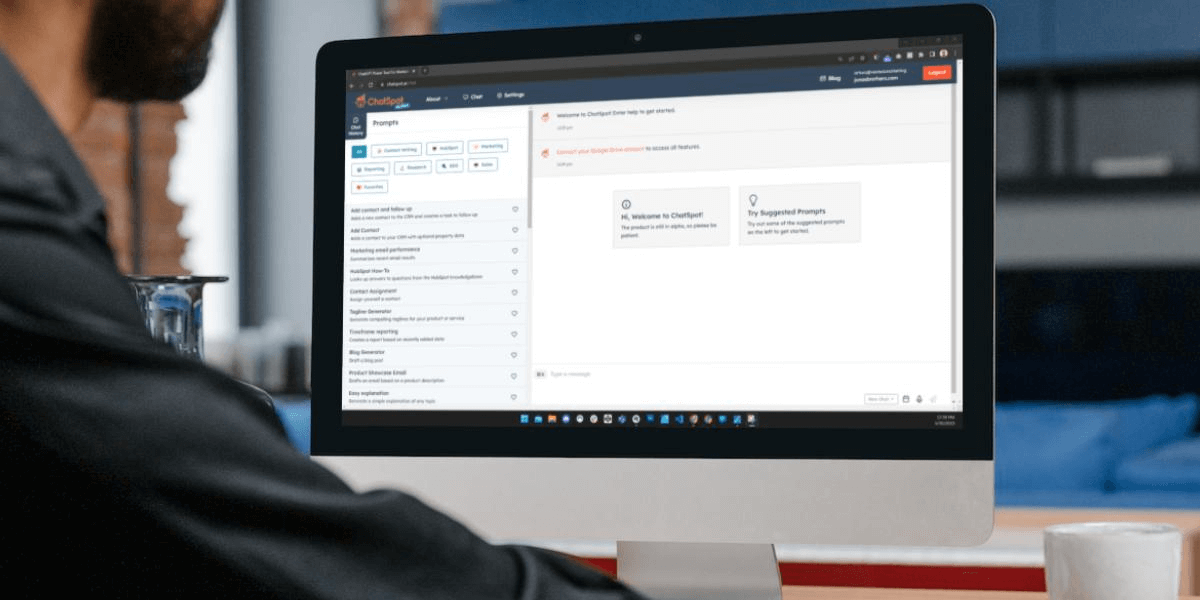How Does SEO Work With Google?
Google helps connect people with the information, products, and services they're looking for everyday. Many times Google is the one and only...

You have probably heard of SEO before, but do you know what it means? Search engine optimization is the process of improving your website so that it ranks higher on search engines.
There are many factors involved in this complicated process. The first step to getting your site ranked higher is understanding how Google works! Here are some tips for getting started with SEO.
SEO is all about getting your website to rank higher in Search Engines like Google. Search engines use complicated algorithms to determine which websites they want on their top searches, so it's important that you understand how these formulas work before you try optimizing your site for them.
Not sure if you're website is optimized to be noticed on Google or not? Use our free website audit to gauge it's strength.
If Search Engine Optimization sounds confusing or overwhelming, don't worry! We are here to help you. This guide will help you get started with Search Engine Optimization in no time. Here's some easy tips to get started with Search Engine Optimization.
*See Google's latest Helpful Content Update!
Search engines are the most popular way people find websites like yours, and if your site isn't optimized for them, then it won't show up in search results.
Search engines give your website a score (or rank) based on Search Engine Optimization factors. These include things like the quality of content, how often you update your site, if people are talking about it online and more.
As HubSpot Diamond Partners, we've dedicated time and resources to implementing SEO best practices through content digital marketing and testing what works and doesn't work to be successful.
As such, below are 7 main points every business should take into consideration.
2. Consider crawling and indexing
3. Use right keywords and phrases
4. Be Strategic with Meta Data
5. Optimize technical components
6. Follow Google's basic SEO rules
7. Website Accessibility Compliance
Search engine optimization methods are tailored to each website's strengths and weaknesses and broken into three primary categories:
How your website is built can determine if it'll be successful to implement SEO and AEO best practices. The behind the scenes web languages and technology that holds your site together, such as static vs. dynamic pages, content management systems, and quality of HTML/CSS, all attribute to your SEO & AEO authority.
Ensuring that all the information (text, images, media) on your site are thoroughly structured and accessible to both search engines and people. Ask yourself, "Does my content answer the needs of my visitors?"
Impressions (views) on your website, a key to growing your SEO power. The use of social media and email marketing create buzz and "eyes" on your website, contributing to the success of your SEO strategy. Additionally, increasing backlinks from search engines on respected websites in turn earn your site authority, and ultimately boost your rankings.
In addition to the people viewing your website, search engines are robots that constantly read (otherwise known as "crawl") your website. Their objective is to find if your website has relevant content that can answer the question's people search for.
Below are key terms to know:
So how do search engines like Google determine what's relevant and what's not? This is where SEO best practices are necessary to rank, beginning with keywords.
Keywords and phrases are the terms that people are searching for, whether it's a product, service, or question.
By leveraging keyword research tools such as HubSpot's SEO tool, SEMrush, Ubersuggest, or even AI content generators, you can see valuable data that provide insights into what your prospects are googling. It answers the below questions:
These insights enable you to be strategic with the content you produce throughout your website. This helps Google understand how you're content is relevant and in turn, establishes authority for your domain and begin ranking your URLs.
Now that you know what keywords to use, how do you leverage them? Be strategic throughout the structure of your website by utilizing the main keywords in the below:
Again, Google is crawling your website for keywords and search phrases, so by adding those words throughout your content, it's giving search engines a thorough outline on a search term.
You can take these keywords to the next level by backlinking them to other relevant, trustworthy websites to gain more visibility on Google's radar. When you backlink, you're connecting more relevant content for Google to crawl and increasing your SEO power.
Want to know more on backlinking? Check out the article from our friends at the Goldie Agency "What are the most powerful backlinks?"
Another way to maximize the outline you're giving Google is by optimizing the below technical components.
The world rotates around Google, and as such, there are a few SEO rules to keep in mind.
Google, like other search engines, uses a series of algorithms to decide which pages to return in response to a search. As previously mentioned, these algorithms use factors such as:
In fact, it’s believed that there are 200+ ranking signals that influence search results. *Update as of July 2024: Google's Ranking Factors Leaked!
The main thing to remember is that Google wants to return SERPs that are as relevant as possible to the search intent behind a search. It also wants the pages it returns to be high quality.
The time it will take for your website's search engine rankings to begin improving depends on several of its characteristics prior to optimization.
Older websites, with diverse backlink portfolios—and more trust from search engines—generally begin to climb in rankings faster than newer sites.
The average website, at least one or two years old, will typically show first signs of improvement in search within 2 or 3 weeks of optimization. It often takes 8-10 weeks to see significant improvement, as search engines need time to crawl, evaluate, and re-index new content, and react to improved website performance.
That said, ranking isn’t just about search engines anymore. With the rise of Answer Engine Optimization (AEO), brands must also consider how quickly their content can be recognized and cited by AI-powered platforms like Google AI Overview and ChatGPT. AEO focuses on structuring and clarifying content so these systems surface your expertise as the direct answer, which can sometimes accelerate visibility even before traditional rankings fully take shape.
ADA stands for The Americans with Disabilities Act. The ADA is America’s most important law regarding accessibility and civil rights for people with disabilities, including web accessibility. Since 2018, a clear consensus has emerged that ADA compliance covers the online world.
Having an accessible and inclusive website is not only the right thing to do, but such businesses also see increased traffic, reduced bounce rates, improved SEO rankings, and better conversion rates
A new study by Semrush analyzed 847 web domains and found that:
Are you a web developer? We've put together a set of ADA guidelines for web development to ensure your websites are ADA compliant!
Search engine optimization is an essential component of a business’s marketing and sales strategy. With the rise and rapid growth of the Internet and the demise of many traditional (offline) channels to reach customers and prospects such as the Yellow Pages, having a web presence has become increasingly important if not vital.
Reasons for developing and implementing a clear SEO and web presence strategy include:
Because everything rotates around Google now, all companies (no matter what industry) should be optimizing their websites and marketing for SEO. Below are a few of the industries who've successfully leveraged search engine optimization:
Learn more about 11 different industries that benefit from inbound and SEO!
The goals, project scope and budget for search engine optimization and growing a web presence can vary significantly for different businesses. However, the need and importance for having an optimized web presence will only grow over time.
For example, when Practical Engineering Solutions partnered with Stonewall Ventures, they increased their Google ranking because of the authority Stonewall had previously gained, maximizing their company's value.
Another example for one of our clients the oil and gas industry, Keystone Energy Tools, thoroughly organized their content and strategically leveraged key terms and phrases, ultimately helping them rank #1 on Google for their offerings.
If you're looking to grow your business and increase your return on investment (ROI) for your inbound marketing efforts, it's important to partner with the right company. Our inbound marketing services include customizing your HubSpot and Shopify portal, providing strategy consulting, and implementing digital marketing solutions that drive real results for your business.
How to Improve SEO by Using CRM Software - Here is everything you need to know about how to improve SEO by using CRM software. Help your business today by using this fantastic software.
How AI is Changing the Inbound Marketing Industry - Explore how AI is revolutionizing inbound marketing with tools like GPT-4, ChatSpot, SEMrush, and Google's Palm2, enhancing SEO, email marketing, and more
How to Improve E-commerce Website Keywords' Ranking on Google? - Learn how to improve the ranking of your e-commerce website on Google by focusing on the right keywords, strategizing your content, and implementing effective SEO strategies.
![]() As a certified HubSpot Partner Agency, we not only understand the benefits of using the inbound marketing platform to increase traffic and engagement, improve SEO, generate leads, design effective websites and boost sales, we know how to make it happen.
As a certified HubSpot Partner Agency, we not only understand the benefits of using the inbound marketing platform to increase traffic and engagement, improve SEO, generate leads, design effective websites and boost sales, we know how to make it happen.
We are inbound marketing experts, SEO gurus and top-notch website developers.
Our team of Engineers Turned Marketers can help get you noticed - for a more innovative and effective way to reach customers, or provide a more seamless way for companies to find your services. Inbound Marketing has no limit to industry, serving from Crypto & NFT, mining, oil and gas, technology & automation, engineering, technology, construction, healthcare, to industrial & manufacturing.

Google helps connect people with the information, products, and services they're looking for everyday. Many times Google is the one and only...

Local SEO is essential for businesses looking to attract nearby customers. By using SEO techniques to dominate local search, you can increase...

In the rapidly evolving digital ecosystem, Artificial Intelligence (AI) is revolutionizing inbound and digital marketing. This blog delves into how...